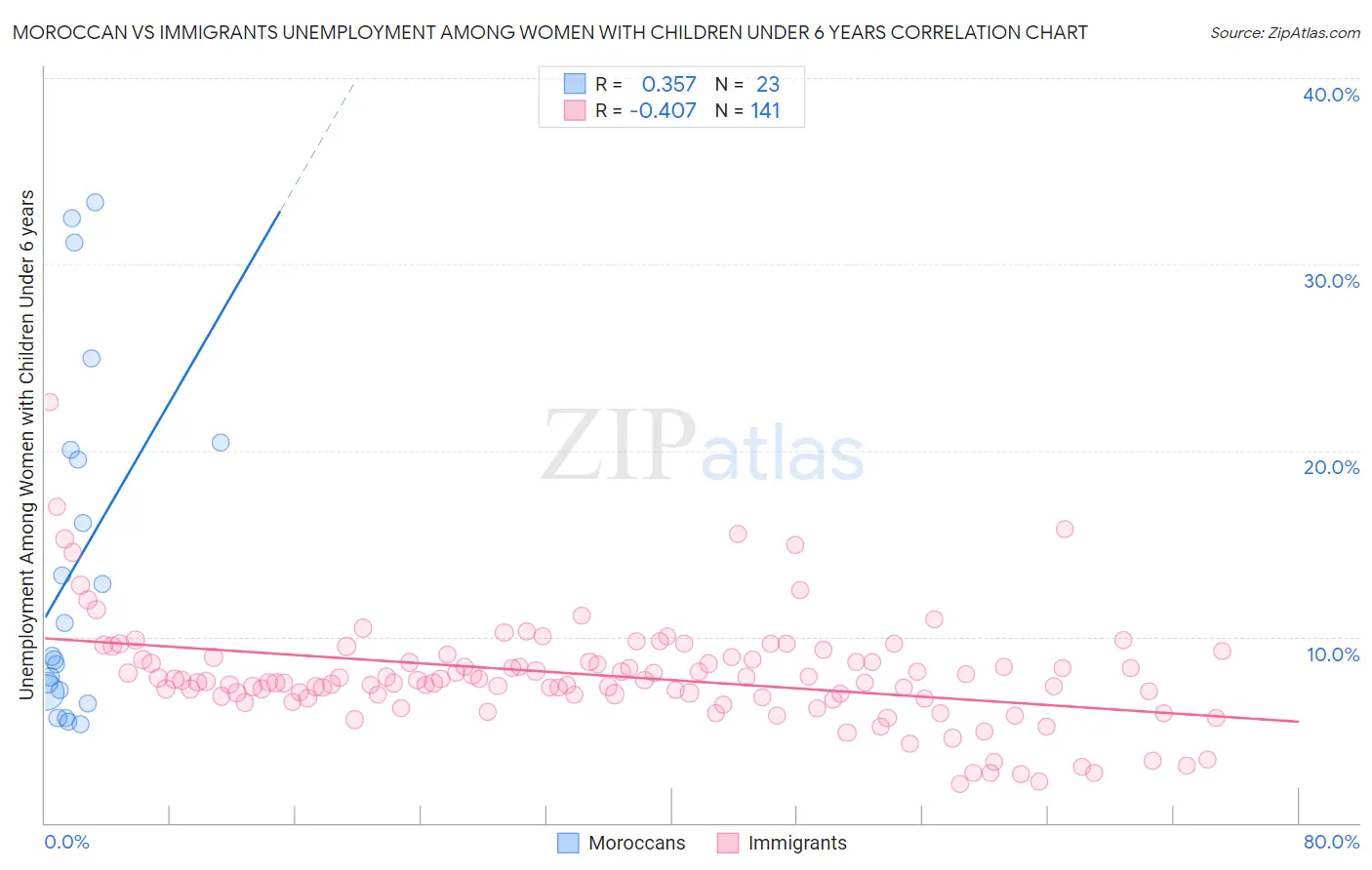Moroccan vs Immigrants Unemployment Among Women with Children Under 6 years
COMPARE
Moroccan
Immigrants
Unemployment Among Women with Children Under 6 years
Unemployment Among Women with Children Under 6 years Comparison
Moroccans
Immigrants
7.9%
UNEMPLOYMENT AMONG WOMEN WITH CHILDREN UNDER 6 YEARS
9.7/ 100
METRIC RATING
218th/ 347
METRIC RANK
7.8%
UNEMPLOYMENT AMONG WOMEN WITH CHILDREN UNDER 6 YEARS
21.4/ 100
METRIC RATING
205th/ 347
METRIC RANK
Moroccan vs Immigrants Unemployment Among Women with Children Under 6 years Correlation Chart
The statistical analysis conducted on geographies consisting of 172,421,104 people shows a mild positive correlation between the proportion of Moroccans and unemployment rate among women with children under the age of 6 in the United States with a correlation coefficient (R) of 0.357 and weighted average of 7.9%. Similarly, the statistical analysis conducted on geographies consisting of 380,514,538 people shows a moderate negative correlation between the proportion of Immigrants and unemployment rate among women with children under the age of 6 in the United States with a correlation coefficient (R) of -0.407 and weighted average of 7.8%, a difference of 1.5%.

Unemployment Among Women with Children Under 6 years Correlation Summary
| Measurement | Moroccan | Immigrants |
| Minimum | 5.3% | 2.1% |
| Maximum | 33.3% | 22.6% |
| Range | 28.0% | 20.5% |
| Mean | 13.9% | 7.9% |
| Median | 8.9% | 7.7% |
| Interquartile 25% (IQ1) | 7.0% | 6.8% |
| Interquartile 75% (IQ3) | 20.1% | 8.8% |
| Interquartile Range (IQR) | 13.1% | 2.1% |
| Standard Deviation (Sample) | 9.2% | 2.9% |
| Standard Deviation (Population) | 9.0% | 2.9% |
Demographics Similar to Moroccans and Immigrants by Unemployment Among Women with Children Under 6 years
In terms of unemployment among women with children under 6 years, the demographic groups most similar to Moroccans are Arab (7.9%, a difference of 0.070%), South American Indian (7.9%, a difference of 0.090%), Immigrants from Nigeria (7.9%, a difference of 0.11%), Immigrants from Lebanon (7.9%, a difference of 0.23%), and Ecuadorian (7.9%, a difference of 0.24%). Similarly, the demographic groups most similar to Immigrants are Hungarian (7.8%, a difference of 0.020%), Canadian (7.8%, a difference of 0.070%), Lebanese (7.8%, a difference of 0.080%), Spaniard (7.8%, a difference of 0.18%), and Sudanese (7.8%, a difference of 0.20%).
| Demographics | Rating | Rank | Unemployment Among Women with Children Under 6 years |
| Basques | 24.7 /100 | #201 | Fair 7.8% |
| Sudanese | 23.5 /100 | #202 | Fair 7.8% |
| Spaniards | 23.3 /100 | #203 | Fair 7.8% |
| Lebanese | 22.2 /100 | #204 | Fair 7.8% |
| Immigrants | Immigrants | 21.4 /100 | #205 | Fair 7.8% |
| Hungarians | 21.2 /100 | #206 | Fair 7.8% |
| Canadians | 20.6 /100 | #207 | Fair 7.8% |
| Immigrants | Syria | 18.9 /100 | #208 | Poor 7.8% |
| Costa Ricans | 17.6 /100 | #209 | Poor 7.8% |
| Poles | 16.0 /100 | #210 | Poor 7.9% |
| Immigrants | Ecuador | 14.9 /100 | #211 | Poor 7.9% |
| Swiss | 12.3 /100 | #212 | Poor 7.9% |
| Scottish | 11.4 /100 | #213 | Poor 7.9% |
| Spanish | 11.3 /100 | #214 | Poor 7.9% |
| Ecuadorians | 11.2 /100 | #215 | Poor 7.9% |
| Immigrants | Lebanon | 11.1 /100 | #216 | Poor 7.9% |
| Immigrants | Nigeria | 10.3 /100 | #217 | Poor 7.9% |
| Moroccans | 9.7 /100 | #218 | Tragic 7.9% |
| Arabs | 9.4 /100 | #219 | Tragic 7.9% |
| South American Indians | 9.3 /100 | #220 | Tragic 7.9% |
| Immigrants | Germany | 8.5 /100 | #221 | Tragic 7.9% |